

Newsletter of Pembroke College Cambridge Issue 28 Spring 2024
Martlet
Pembroke College
Cambridge CB2 1RF Telephone 01223 338100 Email: martlet@pem.cam.ac.uk
Editor Alex Houen
Gossip Editor
Sally March
Illustrations
Martin Rowson
© Pembroke College 2024
Photography and illustrations copyright of the owners
Design
Mark Mniszko
Print Langham Press
The Master, Lord Smith of Finsbury
Last year, when I wrote, we were on the verge of completing the first half of our new Mill Lane development; and I am thrilled now to report that it is finished, and up and running, and being put to good use already. This first half comprises the first courtyard, the Auditorium, the exhibition space, the new gatehouse, the teaching and meeting and seminar rooms in 4 Mill Lane, and the social centre for the whole site. We even now have our very own zebra crossing, linking the two parts of Pembroke across Trumpington Street (hence Rowson’s cover image!). The second half, containing all the new student accommodation surrounding Dolby Court, will be completed this summer. We are hoping that the first students will be able to move in this September, and the whole site will buzz with life and energy as a result.
In June of last year, Dagmar Dolby – Ray Dolby’s widow – came with her grandchildren to cut a ribbon and declare the first part of the site open. One of the great delights of that evening was hearing alumni who had come for the ceremony, walking into the courtyard for the first time and seeing the buildings on either side, and saying ‘Wow!’. There were two things we had said firmly to the architects at the outset of the project, and they have delivered on both. One was that one of the great glories of Pembroke’s historic site is that there are no completely enclosed courtyards. You are always looking through to something beyond; and we wanted exactly the same principle to apply on the Mill Lane site. As I noted last year, it does. The second thing we said was that we didn’t want a stand-out ‘signature’ building. We wanted the new site to be handsome, and contemporary, but we wanted it to be built in brick and stone and to fit in with everything around it. They’ve successfully done this too.
One of the glories of the new site is the auditorium, which we’ve created out of the old United Reformed Church. It’s stunning. We’ve kept all the original architecture (with its rather good acoustic), but have put in a new stage, new flooring, heating, lighting, and a sound system. And most importantly we’ve put in new seating. We organised a bespoke design for the seats with a British firm, and we asked that they would be good for a student attending a lecture taking notes on their laptop, and also for someone attending a concert in the evening and wanting to feel comfortable through a couple of hours of music. We believe we’ve achieved both, and everyone who has sat in the chairs has said how brilliant they are!
We’ve been putting the Auditorium through its paces, too. From Christophe Pregardien singing Schubert and Schumann lieder in Lent term, to Alastair Campbell on stage and Rory Stewart on screen in Michaelmas, there has been a rich variety of events. Alastair and Rory were talking about collaboration across political divides, and heaven knows we need such discussion more than ever at the moment.
My own favourite part of the whole site will be installed during this summer. In the tower of the old church – which is very high, and hollow inside – we are building a climbing wall. We’ll be the only College in Cambridge with this distinction!
Whilst all the excitement of the new development has been happening, the College has of course been getting on with the business of providing the very best possible environment and education for our students. We’ve had strong academic success: when the results for our students
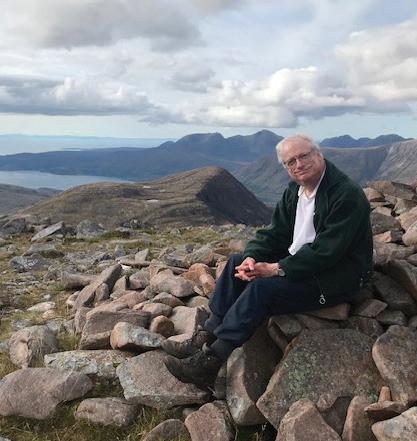
finally came through last October, we had achieved 37% Firsts overall (the third highest percentage of any College), and for our finalists the figure of Firsts was 43% (the second highest in Cambridge). I have to observe, wryly, that this wouldn’t have been able to be said in my day. Nor, in my day, would we have been able to congratulate a Pembroke student – Emilia Bushrod – on captaining the University Women’s Rugby team to victory in the Varsity match against Oxford. We’re very proud of her. And another Pembroke student, Ivan Gega, captained the University Ice Hockey match against Oxford – and won, for the sixth year in succession. In other aspects of College life, we have also been flourishing. Our Choir, under the leadership of Anna Lapwood, continues to go from strength to strength, regularly appearing on both Radio 3 and Classic FM; they will be heading to Zambia for a tour in the summer. Pembroke Players have been putting on a flurry of exciting plays, and holding regular ‘Smokers’, which are a crucible for stand-up comedy. Pembroke Politics have been inviting a broad range of speakers, from a former Conservative Deputy Prime Minister to a former Editor of the Guardian. The May Ball will be happening as usual in mid-June, focused around the theme of ‘Time Warp’ – and I have said very firmly that those attending will not see the Master gyrating to the Rocky Horror Picture Show!
I will be stepping down as Master in the summer of 2025, and the College has already embarked on the process of seeking my successor. I very much hope that whoever it is – and there are, I believe, some excellent candidates –will seek to uphold what I regard as ultimately supremely precious about Pembroke: the spirit of openness and community that characterised the College back half a century ago, when I was a student, and still characterises the College now. Sustaining and supporting all of our students, from wherever they come; nurturing our Fellows and the research and teaching they undertake; and respecting our staff, who make all of this possible: these are the things that Pembroke is all about. And I have every confidence that the next Master will dedicate themselves to ensuring that we keep it that way.
2
Contents 3 Desk Crocodile 4 Living Longer, Living Together
The FinanceEnchanted Lawyer
40
women being admitted to Pembroke
Bounds
LEAP!
Growing Sustainability
5
6-7 Celebrating
years of
8
and
9
this
11
Up for Queer Comedy
Line, the Globe, and
Bird 13 Fostering Freedom of Thought 14 Gossip 15
Corner
10 How Big is
Country Anyway?
Standing
12 A
a
Poet’s
Published by
product is made of FSC®-certified and other controlled material. This product is made of material from wellmanaged, FSC®-certified forests and other controlled sources.
This
‘Wow!’
Desk Crocodile
Mark Wormald on Pembroke’s Creative Writing Masterclasses
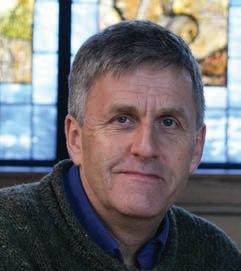
In 2011, when I was Senior Tutor, two conversations within weeks launched a tradition. Nicola Riley, great and generous friend to Pembroke who sponsors our annual Riley Declamation Prize, in memory of her father Brian (1959), came for tea before that year’s Declamation. Nicola wondered how I would feel about a further annual donation to support a student-focused initiative of my choosing.
Then Matthew Mellor, our Development Director, introduced me to Richard Beard (1985). Novelist, memoirist and broadcaster, and the author of eleven books, Richard is one of our finest writers. As founding Director of the National Academy of Writing, he’d developed a series of masterclasses for students enrolled on creative writing courses. He adapted them from the Conservatoire method, in which leading instrumentalists offer practical advice to outstanding young performers on a particular piece of music: an audience listens along. Richard’s innovation was a public edit of two samples of narrative prose, to which only their authors had the right of reply. Even in summary the masterclasses sounded terrific; in particular, to a Fellow in English who has always loved Cambridge’s focus on teaching our students the bracing joys of close reading, they sounded like genuinely Practical Criticism. Might we try them here at Pembroke?
audience get them too, twenty-four hours in advance. Everyone’s encouraged to take notes.
But it’s Richard’s edits which remain at the heart of each evening: shrewd, lucid and unfailingly practical insights delivered on each text, by one published author to another who aspires to be, identifying snags, suggesting ways round them. They combine precision with resonance. Here’s some of what I heard this February: ‘Sometimes a text hasn’t yet settled into what it knows; editing is about bringing everything you know to the text as it is.’ ‘Keep the reader in the text.’ ‘The writer has to manage information and its release to the reader.’ ‘We all prefer can’s to can’ts’. ‘Stories are essentially gossip, and the reader is always interested in the specific.’
Then there are the stories our starry guests have told, essential gossip from their place of writing. No two have had the same process; all insist on the importance of their own. Irish writer Kevin Barry’s begins before dawn: only a cup of tea stands between him and the first and best of his consciousness at the laptop, email strictly forbidden. Kevin discovered, forty-five drafts into his story ‘Into the Hills’, that their five or six thousand words should really be fifteen hundred. Playwright and screenwriter Jack Thorne (1998) knows this sheer plod to exhilaration. Ten hours a day in his study, seven days a week; since the birth of their son, a concession: six and a half days.
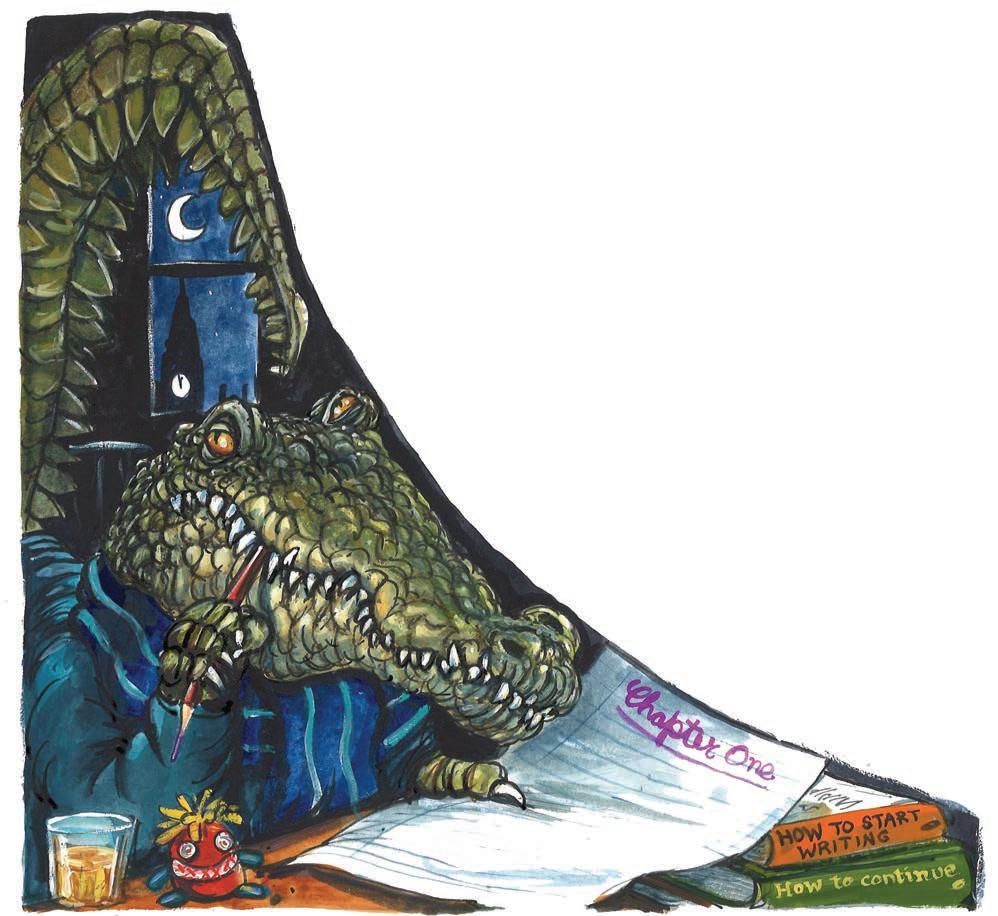
Among tricks and charms of the trade, Richard recalls the crocodile Sarah Perry brought us from her desk; I remember the candle she lit, the glass of whisky she poured, to put the day job behind her and enter the magic circle of her evening’s writing. Deirdre Madden knows a book is finished when she can read it aloud to herself and not want to change anything. (She’s right: I urge my students to try it on their dissertations.) We’ve seen notebooks flourished, from pockets or satchels; iPhones too. Max Porter’s first novel, Grief is the Thing with , he sent to himself via emails; Alan Hollinghurst filled a page a day of a desk diary until year and novel, The Swimming Pool Library, were done. Maxine Roffey works in bed, facing a cork board on which, like a tv detective, she accumulates evidence, images, research; then writes a thousand words a day, every single day, until the first draft is done and the fun really starts.
A Pembroke alumna recently recalled the evening she spent in 2013 listening to Kazuo Ishiguro in the Old Library as the kind of life-changing opportunity we must keep offering our students. One of the student authors that night, to both of whom Ishiguro sent his own set of helpful notes, was Tom Crewe, who went on to win the 2023 Orwell Prize for Political Fiction for his first novel . Nobody who heard Claire Keegan analyse two anonymous paragraphs, one word-perfect, the other slack, will ever forget the moment when she unveiled their authors as Chekhov and Tolstoy. One Honorary Fellow described the evening as one of the best and most innovative pedagogical experiences he’d ever witnessed over a very long career. The writers seem to relish the experience too. With our next three lined up, a brilliant new venue in our new Auditorium, and the continuing support of Nicola Riley, this novel Pembroke tradition looks set to continue.
3
Mark Wormald
Living Longer, Living Together
Stephen John on the 18th William Pitt Seminar, ‘Live and Let Die?’
In 1974, life expectancy at birth in the UK was a touch over 72 years old. Today, the average child can expect to live to around 82. We can see the same trend across the world. While, in more contemplative mood, we might agree with Bernard Williams that immortality would be tedious, these trends seem good news, a testament to social progress and advances in the biomedical sciences. After all, when a loved one dies, it is entirely normal to wish they had lived longer, in order to see a grandchild grow up or celebrate an important anniversary or perfect a tricky dance move.
However, increased longevity may be a two-edged sword. Living longer lives is not the same as living healthier lives. Maybe, as some health economists argue, we should focus attention less on how many life-years we enjoy and more on the quality of those life years. Increases in life expectancy may be problematic not only for individuals, but also place pressure on social and healthcare systems which were designed for a very different demographic situation.
These issues were just some of the ones addressed in the Eighteenth William Pitt Seminar, ‘Live and Let Die?’, hosted in Pembroke’s wonderful new Auditorium last October. As my brief remarks above suggest, the vicissitudes of an ageing population are a wicked problem, criss-crossing topics from the challenges of pensions reform to the meaning of a Good Life, and, so, the topics were discussed from a wide range of perspectives.
In an inspiring presentation, Julia Bird (2005) drew on her background in development economics to talk us through a series of creative responses to the challenges of an elderly population. A key theme in Julia’s talk was that, just as feminism has forced economists to recognise the importance of ‘care work’, so, too, we should expand our sense of what the elderly might contribute to society, both directly – say, through childcare or volunteer work –but also in a broader sense of contributing knowledge, wisdom, and connection.
In the second presentation, drawing on his own research on diabetes, Rav Seeruthun (2018) discussed some of the ways in which another major modern trend, the growth of digital technologies, might be used to develop new responses to the health challenges associated with an ageing population. While such technologies are often presented as a panacea, Rav was keen to stress how they might also generate new forms of inequality between the digitally connected and unconnected, thereby exacerbating the worrying health inequalities we already see across the life-course.
Our third presenter, Pauline Essah (1999), placed our problems within the context of global inequalities. As Pauline reminded us, while life expectancy is increasing across the world, different countries have very different demographic structures. In turn, as the United Nations’ ‘Sustainable Development Goals’ remind us, there is far more to living a good life than merely living longer, and far too few people are even living a moderately tolerable life. While the first three presentations were clear-eyed about the challenges of an ageing population, they all contained hope that technological and institutional changes might improve the situation. For my presentation, I adopted the traditional role of the philosopher and suggested things might be even worse than we imagine. Following a suggestion from the social theorist W. G. Runciman, I
proposed that we might well underestimate the important gaps and differences between the perspectives of the young and the elderly. On the face of it, these differences might seem like something we ought to recognise and value, in much the way Julia suggested. Furthermore, recognising these gaps suggests various solutions to familiar problems about resource allocation, providing useful ways of reconceptualising the provision of care for the elderly.
However, recognising these gaps can also be dangerous. We live in a society underpinned by a series of solidaristic social systems. In turn, feelings of solidarity typically rely on a sense that we are similar in relevant respects; when the worker in some industry goes on strike in solidarity with workers in another industry, she does so, in part, on the basis of a sense of a fundamental similarity. If so, recognising the differences between age cohorts may be a tricky business, insofar as doing so may undermine the systems which bind us together. Is this breakdown inevitable? Of course not. However, it is difficult to see how we can simultaneously respond to the challenges of an ageing population while maintaining a sense that we are ‘all in this together’.
Responding to the challenges of an ageing population is, then, a complex problem, which requires us not only to rethink institutions and technologies, but also the paradigms we use to develop and assess institutions and technologies in the first place. We knew that before we started the seminar. However, the unexpected theme which linked the four presentations, and the lively discussion which followed, was the importance of thinking about inequalities regarding ageing. We heard lessons drawn from debates over gender inequality, worries that technology can exacerbate health inequality, concerns about global inequality, and about the need to

Stephen John is Hatton Professor in Philosophy of Public Health at the Department of History and Philosophy of Science. He is also a Fellow at Pembroke, where he is Director of Studies in Philosophy and in History and Philosophy of Science. His research focuses on the relationship between political philosophy and philosophy of science. His book Objectivity in Science was published in 2021 with Cambridge University Press.
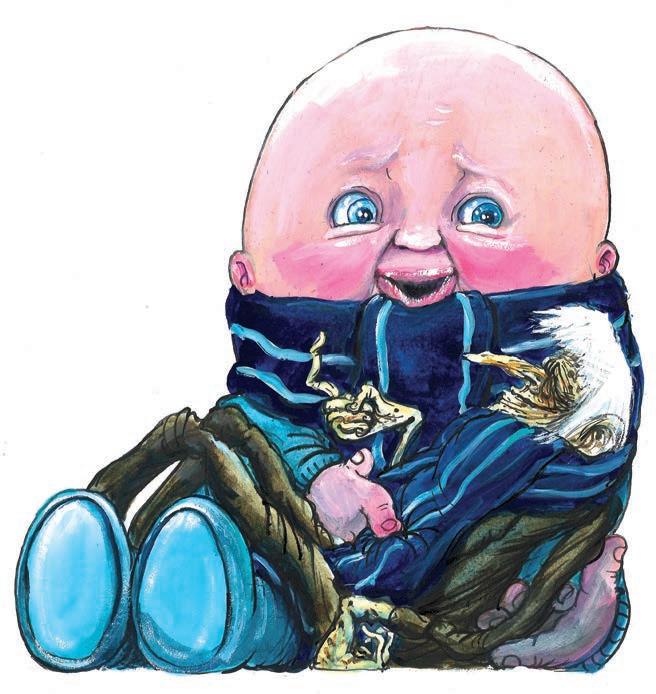
4
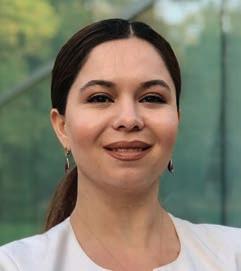
Dr Lalafaryan is University Assistant Professor of Corporate Law in the Faculty of Law, Fellow of Pembroke since 2023, and Fellow of the Cambridge Endowment for Research in Finance since 2024. Her book Material Adverse Change Clauses (forthcoming with Oxford University Press) is based on her PhD thesis, for which she won Cambridge University’s Yorke Prize and the Society of Legal Scholar’s Best Paper Prize.
The Finance-Enchanted Lawyer
Narine Lalafaryan reflects on her love of Cambridge and work in Law and Finance
How Cambridge happened to me, and how I happened to Cambridge
It is March 2024, and I am writing this piece in my beautiful office in Pembroke: the sun is shining brightly on the Old Court. As I am typing this, I cannot stop thinking that it was precisely ten years ago early in March when I received my Master of Laws offer from Cambridge – a journey that was very important for me both in professional and personal ways (I met my husband in Cambridge). I later did my PhD in Law and Finance in Cambridge and got my first tenure-track position at University College London – times that I will always cherish and be grateful for. A year ago in March, I received that special call to join Cambridge as an Assistant Professor of Corporate Law. ‘It is time to go home!’, I thought, excitedly. Cambridge has been a home for me, away from my home, Armenia. Later that year, I was also very fortunate to join Pembroke as a Fellow in Law. A lot has changed in the past ten years, and I cannot wait to see where the next ten years will take me.
How and why I love Law and Finance
What has not changed, though, is my passion for interdisciplinary work in Law and Finance. I immersed myself in Financial Law during my graduate studies: an interest partly driven and inspired by a phenomenal woman figure, Professor Eilís Ferran, FBA, who was teaching Corporate Finance Law. This year, I myself lectured on that Corporate Finance course in Cambridge!
Thinking about law more generally, as a discipline, it is never on its own. There is a bit of everything in it: history, development, technology, politics, art, and science. And there is a lot of ‘life’ in law. In my case, it is about how Law and Finance interact with each other and impact on us. I am fascinated by the dynamic and increasingly important role that law plays in improving and addressing how companies finance and govern themselves worldwide, and the significant impact that these decisions play on the global economy and markets. I usually get very excited when dramatic things happen or are about to happen (e.g., the 2023 banking crisis) – an excitement that in our daily lives that many people find
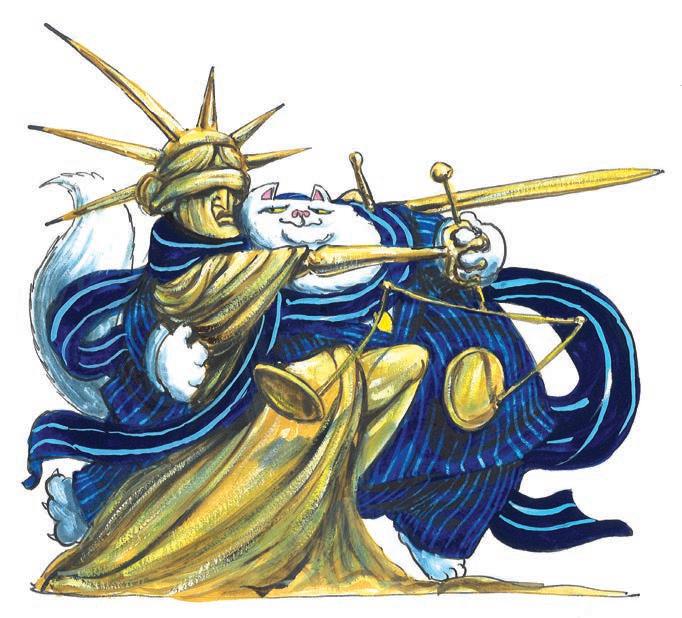
are developments that keep me on my toes in my line of work.
The driving issues and questions for my current project
My current bigger project is entitled ‘A Quantum Leap in Corporate Finance’, and it re-evaluates foundational legal questions in corporate finance due to developments in the corporate markets since the Global Financial Crisis (GFC) of 2007-2008, including changes that have recently occurred with the COVID-19 pandemic, the 2023 banking crisis and the environment of high interest rates and inflation. There has been a quantum leap in corporate finance: a momentous change in investment structure and incentives. When we look back at the corporate finance landscape over the past years, we will notice many changes. My project is focused on four major developments.
First, there is more debt in corporations now than there ever was previously. Corporations did not fully recover from the GFC, when COVID-19 started. The collapse of a number of banks in the US in March 2023 and the near collapse of Credit Suisse in Europe are a strong reminder of the importance of debt capital as a lifeblood of business. Second, there is also a change in the nature and identify of providers of finance: we nowadays have traditional finance providers (banks), but we also have non-traditional lenders, such as non-bank lenders (private credit funds). They offer loans directly to the companies without bankintermediation. These private credit funds are now competing with traditional finance providers, and their power, their appetite, their experience have all been increasing.
Third, there has been a redesign of corporate finance markets also due to the significant rise of private capital (private equity, venture capital, and private credit). The gradual and continuous migration from public to private markets has been fuelled by the extensive banking regulation reform that was introduced in the aftermath of the GFC. Such a redesign, arguably, blurs the traditional lines between ‘equity’ and ‘debt’ investments in private markets.
Finally, modern debt investment looks a lot like equity. We have not seen this kind of environment in the past twenty years. Modern day debt investment offers very attractive nominal returns because of the higher interest rates. These debt investors are interested in governance of firms outside financial distress because their investment is like equity.
What I am particularly interested in pursuing in this bigger research project are the answers to the following questions: What do the developments in the corporate finance markets mean for the role of debt in firms, and what do these developments mean for the relationship of debt and equity capital in firms? What is the role of law in addressing these issues? Has the law kept up with these developments? Do we need to make changes? And if yes, then where, how, and when?
My research aims to close an important gap in legal and finance scholarship: the under-studied relationship of modern equity and debt, and what this quantum leap post-GFC means for the traditional legal and economic frameworks on corporate finance and governance. Answering these questions is very important for ensuring that our legal framework reflects market reality, helps to improve it, and, importantly, is fit to counter harmful practices.
5
1984-2024: Celebrating 40 years of women being admitted to Pembroke
Aryanisha (Charlotte) Lawes (2008)
Ask any student, alumnus or staff member what makes Pembroke Pembroke and they are very likely to tell you it’s friendly. To the uninitiated, this may sound like calling someone ‘nice’: the emotional equivalent of beige paint. To fellow Harry Potter fans, it could make you sound a bit …. Hufflepuff. But not to those of us who have lived, worked, studied, danced, bowled, eaten, laughed, cried and loved inside these walls.
It’s this spirit of friendliness and friendship that has brought together a group of students, staff, alumni and alumnae to plan and organise the celebration of 40 years of women being admitted to College from Michaelmas this year. That admission in 1984 was a moment when society became more friendly. I matriculated in 2008, so you’ll need to forgive me if this is glossing, but in my eyes the change had nothing to do with being ‘nice’ and everything to do with evolving
To be friendly means to orient oneself in the world in a way that’s receptive, curious and brave. It requires ethical integrity, intelligence, and a willingness to meet others where they are at, putting aside one’s own views, preferences, and emotions in order to engage. Without a foundation of friendliness and communication society itself is not even possible.
In a time when people’s LinkedIn feeds, news stories, and even their families may seem increasingly divided over critical (and at times petty) matters, to be friendly is a radical act. Beyond anything else – technological advancement, political will, innovation in all fields – it may just be the thing that saves us from ourselves. When we say we are friendly, we think about the smiles, the warmth, the care as we walk around the courtyards, but it is so much more than this. It is both ordinary and extraordinary at the same time. Never underestimate its power.
This year we are of course celebrating the remarkable women who have helped make Pembroke what it is today – from those who have cleaned our rooms and studied in the Library, to the Fellows and generous benefactors who enable the lifeblood of friendliness to pump through the veins of the College. We will shine a light on the many lives who may have gone unnoticed in the grand scheme of things, but to whom we owe a great debt. Every time our group meets, in our little rectangular boxes on Zoom, I feel a deep
sense of gratitude for what I have been given as a student and alumna. Amidst the stresses of life it’s too easy to forget. When I’m in contact with this gratitude, I naturally want to get more involved and give: whether it’s chairing the meeting, writing this article or finding ways to support one of the other members in their work.
We would love you to benefit from and get involved in this celebratory year as much as possible. We will have a day event for women on Saturday 8 March 2025 with a chance to connect, learn, and of course eat together (because if friendliness is the first thing that comes to my mind about the College, the second is food). We are working with student and College committees to weave alumni and alumnae into their events and talks for the year. Three of the College’s six female Honorary Fellows, Vicky Bowman, Gail Davey, and Jo Prior matriculated in 1984, the first year to take women. They have gone on to build fascinating careers in diplomacy and human rights, medical research, and publishing, respectively. In our Zoom planning group, we discuss bringing other inspiring Pembroke speakers to the new Auditorium to contemplate these and many other topics. You will also hear our plans for creating a legacy between this and the 50th celebration in 2034-5 – when I will be 45 and surely out of the ‘young


6
Aryanisha (Charlotte) Lawes read Politics, Psychology and Sociology. She is a leadership trainer and coach. In 2021, she was ordained into the Triratna Buddhist Order and given her new name, Aryanisha, meaning ‘She whose dream is of the Noble Ones’.
alumni’ category!
There will be an exhibition in the new Mill Lane site and we will request alumni and alumnae from the 1980s to gather and share their memories and memorabilia from 1984-85. Far from being uninterested in the minutiae of your lives in those times, this has been one of the abiding fascinations of current students. Details for how to contribute are at the end of this article.
We are also celebrating the College’s friendly spirit itself, which made 1984 possible and has continued to help Pembroke evolve and remain relevant today. I grew up in a small town in the south west. As the first pupil in my school to go to Cambridge, it was not so much my gender but my class background that filtered my experience. I would not be writing to you today, if it were not for the Shadowing Scheme and all of Pembroke’s efforts to attract bright, capable students from diverse backgrounds. Now a coach and supporter of the College’s ‘Leadership, Enterprise, and Adventure at Pembroke’ programme (LEAP), every term I meet undergraduates who would not be in the College if Pembroke had not evolved its precious friendliness. Our ethos ripples out more and more into the world every year. In March, the College community raised £76,000 over Giving Day, to support students at risk of discrimination,
suffering, or violence to come and study at Cambridge. The list goes on.
In some ways, our celebration has nothing to do with ‘women’ as a category at all. I say that not to dismiss my own or anyone else’s achievements, but to emphasise the common ground that unites all of us in times when lines of difference begin to hinder, not help. In 2021, my friend and fellow College Alumnus Claude Muhuza (2008) – who escaped war-torn Rwanda as a small child – introduced me to Audre Lorde’s essay ‘The transformation of silence into language and action’. I am reminded of her plea ‘that we not hide behind the mockeries of separations that have been imposed upon us and which so often we accept as our own’. There is much work still to be done, but it needs to be done in the spirit of friendship. And Pembroke is the perfect place to make such progress.
If you have any memories or memorabilia from the 1984-1985 academic year that could be included in the exhibition, please send them to the College Archivist, Lizzy Ennion-Smith at library@pem.cam. ac.uk or by posting to her at the usual College postal address, marked for Lizzy’s attention.

7
The 1984 Group Matriculation Photo
© Lafayette Photography Ltd
Bounds and LEAP!
Carys Myers (2021) on the ‘Leadership, Enterprise, and Adventure at Pembroke’ programme
Iarrived at Cambridge from a state comprehensive school just outside Liverpool, where I was the only person to be accepted into Oxford or Cambridge. Granted, both my parents went to University, but Oxbridge was unfamiliar territory for them both. My ‘Northern, state comprehensive’ label (largely self-imposed) made me feel like I might just be ticking a box for the College. To add to my sense of being a fish out of water, I also study Human, Social and Political Sciences (HSPS) where I am surrounded by individuals who, alongside their degree, deliver speeches; engage in student activism; try to save the world and probably want to be a future Prime Minister. HSPS is also a degree renowned for its lack of career direction. As a result, I have continually battled feelings of imposter syndrome, lacked in academic confidence and career direction, and do not have networks of people readily available to help with careers and internships. Nor do I live anywhere near London. This is where LEAP comes in.
Leadership, Enterprise and Adventure at Pembroke (LEAP) was a new programme introduced in 2022, when I was just about to begin my second year at Pembroke. Founded by Andy and Cindy Crossley, and run by Hannah Wilson and Kate Parsley in the Development Office, it was created to help students develop their confidence and career prospects in a variety of ways: through workshops, mentoring, internships and adventures. Although the University is filled with incredible resources and opportunities, there still is a significant need for students to access longer-term, personalised careers support.
Joining in Michaelmas term of my second year here at Pembroke, I became one of fifteen members of the first LEAP Cohort, all with varying levels of confidence, career direction and seeming constraints. We were the guinea pigs! I was matched with a mentor from the Civil Service who was able to support me in my applications for summer internships, and provide incredible life advice. As she worked in Liverpool, I was able to meet her in person! Over the year, I also attended various workshops centred around public speaking, overcoming imposter syndrome, and helping with speculative applications – all of which were greatly needed. I also met with the Careers Service (through LEAP) multiple times, who were able to signpost me to resources and job adverts. This wealth of personalised, continuous support stood me in good stead for an internship – which LEAP also helps with!
Because of the support I gained from Corporate Partnership Programme Manager and Interim LEAP Director Dr Kate Parsley, I successfully gained a six-week internship at the Cambridge Institute for Sustainability Leadership (CISL) as a member of its Network Team. By offering internship grants (of up to £1,000, and £2,500 for adventures), LEAP ensure that students are not financially burdened by accepting an internship. As my internship was based in Cambridge over the summer, LEAP covered the costs of my College accommodation and, if needed, was willing to cover the costs of buying office attire and anything I might need to complete my internship.
CISL collaborates with businesses and governments across the world to develop leadership solutions for a sustainable economy. It also provides the space, support and networks for small sustainable start-ups to grow. I had previously expressed an interest in policy formulation, social inequality and the interaction between political decision-making and sociological trends. This aligned perfectly with my internship. I developed my networking skills, which I had also highlighted as something I wanted to achieve, by meeting Chief Sustainability Officers from corporations such as IKEA, Nestlé, ITV, and the BBC (to name a few!). I learnt a lot of practical skills, some being more general – such as organising and scheduling hybrid meetings and getting to grips with Excel – while others were more specific, such as analysing data and qualitative information. I was also given the freedom in my final week to meet with other teams across CISL, such as the Policy, Education and Social Justice Teams. My line manager at CISL arranged bi-weekly personal development meetings which helped to shape my internship and make it as beneficial for me as possible. It was an experience I will always be grateful for.
From speaking to other LEAP participants, the positive effect the programme has had on them is very clear. Until last term, I was Pembroke’s Undergraduate Access Officer. In this role I was asked to sit on the LEAP Steering Group as a student representative. This put me in the unique position of being able to experience LEAP and also provide feedback on the scheme reflecting my own views and others’. Word has also spread throughout the College, and the positive experiences from other participants (not just myself!) are reflected in the increased cohort size this year.
For me, LEAP has achieved what it was set up to do. It has helped me find career directions that I am passionate about, and it has given me the transferable skills and tools to be able to achieve these opportunities. LEAP has also enabled me to grow by enhancing my academic confidence, and provided me with techniques to combat my imposter syndrome. I wholeheartedly believe LEAP is one of Pembroke College’s biggest USP’s amongst Cambridge colleges and I hope it continues for many years to come. I hope it continues to help people ‘like me’. LEAP has proven to be something that I didn’t think I would need, until I came to Cambridge.
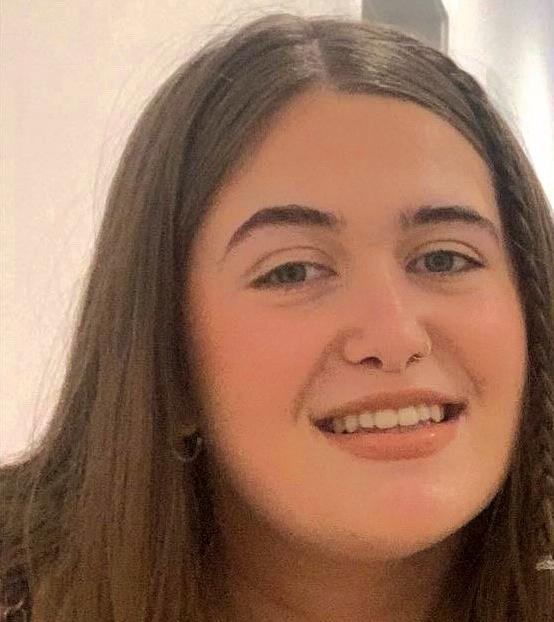

8
Carys Myers is specialising in Sociology for her HSPS degree.
Growing Sustainability
Sally March on greening Pembroke

One of the pleasures of working at Pembroke is that my desk affords me a lovely view of the Dolby Magnolia – although it can be disconcerting when I look up and find myself eyeballed by one of the resident jays, of an equally beguiling pink.
The College is a workplace, a home, a teaching space and a historic site, and as such has a complex place in local environment and ecology. We have a duty to maintain this for everyone who works in it, not just now but long into the future.
Sustainable design was a significant consideration during the design of the Mill Lane site. The construction of the Ray and Dagmar Dolby Court has been designed to comply with a BREEAM Excellent rating. Wherever demolition has been necessary, as many bricks as possible have been repurposed. An air source heat pump system will heat and cool the buildings, and solar panels have been installed on Milstein House and the north and west ranges of the new court, generating electricity for the site. Special care has been taken to ensure that the planting is drought resistant.

But what about the medieval College site and the hostels? It is likely that every former student will have memories of draughty and cold student rooms. As its gaspowered heating systems approach the end of their natural lives, the College is steadily converting its properties to run off electrically powered air source heat pumps. 54 Trumpington Street was the first hostel to be converted with the help of a Salix decarbonisation grant. On the main “campus”, this spring will see the completion of the installation of a heat pump in Foundress Court, again funded with the help of a £680,000 Salix grant. When Dolby Court comes on stream, a third of student accommodation will already be heated this way.
Preparatory work is being undertaken on properties while they are being refurbished. Larger diameter circulation pipework and larger surface area heat emitters are being installed in order to facilitate air sourced heat pumps to be fittedwhen the gas boilers eventually need to be replaced, with minimal disruption to students.
Another important physical change carried out during the regular refurbishment of staircases and hostels is the installation of secondary glazing, focusing on rooms facing the street due to the dual benefit of thermal insulation and reducing external noise. For the past nine years conventional lighting has been steadily upgraded with LED light fittings and sensors in communal areas reduce the amount of electricity used by lighting by around twothirds. Absence detectors have also been installed in some rooms on the main site, which switch the temperature of radiators to 10 degrees centigrade after 45 minutes and then to frost detection after 12 hours.
So why not do everything at once? As Operations Manager Robert Griggs points out, apart from the cost and disruption to residents, green technology is constantly developing and improving, so there is a benefit to a more phased approach to ensure that we utilise the best options not necessarily the first option.
Meanwhile, Head Gardener Sarah Claydon’s philosophy is to reduce the number of bedding plants and focus more on planting perennials, wildlife-friendly and drought-tolerant plants, and, as obvious as it might sound, planting the right plants in the right areas. She has also focused on mulching and reducing the use of chemicals.
In Ivy Court, the elderly lavender plants have been grubbed out, and the border extended so a range of perennials can grow there in the spring and summer. Conversely, the darker and damper bed by the Hall has plants that are at their best in the winter and spring.
A wildflower area has been sown on Foundress Court Lawn beyond the Henry Moore sculpture. It should be a riot of poppies and cornflowers this year, followed by the annuals next year.
Likewise, areas around the plane trees on the Bowling Green by the Avenue are planted with bulbs, including snowdrops, crocuses, narcissi, and tulips as an early food source for pollinators. The plan is to extend this into a complete strip down both sides.
A big challenge is to balance the need for pristine lawns for significant summer events while reducing water use and swapping chemical products for less damaging ones. This comes down to careful management and care, although this year’s damp, mild winter has been challenging. She has been leaving the grass to grow longer in the winter to give the lawns greater resilience in the summer; however, lots of rain can increase the risk of disease.
Managed mowing occurs across the College, with the hostels being ‘no mow’ until June. The removal of much of the box hedging due to a moth infestation has led to the planting of a dead hedge for Green Week. Thanks to the compost heaps in the hostel gardens (and soon, the Fellows’ Garden), the College has been able to reduce drastically the amount of mushroom compost it buys.
Our Catering team has worked hard to raise awareness of the relative carbon footprint of different types of food. In 2023, out of 65,895 meals served in the Servery, 52% were meat-based, 27% vegetarian, and 21% vegan. All fish come from sustainable sources, and from this Lent Term, only one red meat option is available weekly.
Other changes have seen a move to paperless systems in HR and Payroll, as well as a College-wide move to discourage printing where at all possible. Staff and Fellows can apply to the Cycle to Work and EV salary sacrifice schemes.
Our Graduate Parlour has an allotment by the sports ground. The JPC and the GPC Green Officers work tirelessly, with the help of Pembroke Green Society, to recycle more and bin less (especially at the end of the academic year), and strive to be increasingly mindful of their surroundings.
Pembroke was the first college in Cambridge to adopt an ethical investment policy. It is closely involved with the University’s campaign to pressure Barclays and Lloyds banks to remove all their ties with fossil fuel financing. Our portfolio is close to being fully divested from fossil fuels, with discussions with one fund manager to find an equivalent fund without fossil fuels ongoing and our holdings in the CUES, which will follow the University’s 2030 timeline.
A Consultative Committee on Sustainability and the Environment was set up in 2021 and meets at least once a term with representatives from the Fellowship, students and staff. These are issues that we tackle collectively, even at a micro level, and members of the community are constantly challenging us to do better.
9
Sally March is Pembroke’s Development Communications Officer & College Recorder.
How Big is this Country Anyway?
Kat Lange (2003) on running a marathon in every US state
September 2016, Chicago: there I was on the starting line of the Chicago Marathon for the second time. As anyone who has visited knows, Chicago is the ‘Windy City’ on the shores of Lake Michigan, a stunning backdrop for roughly 40,000 runners who were toeing the starting line on this crisp autumn day. Even as I enjoyed the buzz and soaked up the atmosphere, I couldn’t help but notice that I was developing a bad habit of going back to the same locations for marathons multiple times – something I really wanted to avoid so I could visit new places. This was my ninth marathon but only the third US state. As the seed of the ‘50 state challenge’ idea grew, I didn’t feel intimidated by the thought of running another 47 marathons. If anything, it felt like tackling a challenge of this magnitude was somehow quintessential in American life — bigger, bolder, and unfearing. I was committed, and started planning out my grand adventure.
Living in San Francisco at the time, I realised the vast distances I would have to travel, given that only roughly ten states were within range of a two-hour flight. However, that was really the point of this challenge. When else would a Californian visit Nebraska or the Dakotas, for example? I also saw an opportunity to mix up big city races with smaller events off the beaten track – like running a Native American trail in the Badlands of North Dakota. I quickly discovered a new favourite website aptly named Running in the USA, which became an invaluable tool in deciding which race I would target in each state and how to schedule races throughout the year based on optimal weather conditions.
As I started sketching out a preliminary plan, I saw that I would sometimes need to run two or even three marathons in the busiest months of May and October. Another harebrained idea I discovered on this website was the back-toback marathon tool developed specifically for runners who wanted to torture themselves in two different states in one weekend! I deployed this strategy just once to tackle two deep south states: Mississippi and Alabama.
Planning done, off I went in 2017 to work through my rather long to-do list. I found a lot of comfort in developing repeatable habits around each race – how I would plan my travel, pack my stuff, how to taper in race week, how I would prepare once on the ground in the race location … and yet there were so many variables I couldn’t control and had to learn to manage. The biggest factor by far was the weather, although looking back over all my races, I was lucky that by and large the conditions were usually manageable. Yes, I had an unexpectedly snowy race (hello Milwaukee in May!), warmer and more humid conditions than I would have liked (I should have checked the September weather for Kauai, Hawaii), and one race that turned into an eight-hour-long suffer-fest thanks to a lack of aid stations on the trail (the aforementioned Badlands of North Dakota in July).
I finished 2017 and 2018 with six states each, and in 2019 I pushed it to nine states. I felt like I was working through my list at a good clip when COVID-19 shut everything down in early 2020. Fortunately, I had been able to run a Mardi Gras marathon in New Orleans and a race in Texas before all events were cancelled. With some states having few restrictions in the second half of 2020, I was able to squeeze in Nebraska, which was a true wakeup call on the physical and mental toll COVID lockdowns had taken on me. With the uncertainty around continuing
lockdowns and lots of stress at work, training continued to take a backseat in 2021, although I completed another three marathons that year on admittedly poor fitness. Mentally, my turning point came at the NYC Marathon in November of 2021, which felt like a reopening of the city with tens of thousands of spectators lining the streets all day to cheer on runners and have a bit of a party. I hoped this signalled the worst was behind us and the world was opening up again. My impatience was growing, and I wanted to make bigger strides towards completing the challenge!
With that impetus, 2022 became my biggest year with twelve marathons. I felt a newfound appreciation for the ability to travel far and wide and enjoyed the variety of locations that year, from the Biltmore mansion in Asheville, North Carolina, to the lakes and mountains of Idaho and Colorado, to the shores of Rhode Island, Delaware, and South Carolina. 2023 would be the conclusion of my journey if I could tackle the remaining eight states. Seven went off without a hitch but the Iowa marathon I had targeted for March was impacted by a snowstorm. The backup race was the smallest marathon I had ever run: 25 runners dropped off by school bus at a ‘starting line’ in a small town to run through miles of corn fields. The final event was the not-so-glamorous Atlantic City Marathon in October 2023. My elation carried me the whole day, and I crossed the finish line with a big smile and a few tears of joy (or relief).
With this journey now completed, my sights are set on more endurance challenges in the future … you don’t think I’d be putting my legs up now, do you?

Kat Lange studied Natural Sciences (Physics) in Pembroke and matriculated in 2007 with the MSci/BA. She completed her MPhil in Management Sciences from the Judge Business School in 2008. After 12 years working for J.P. Morgan in the healthcare investment banking team in London and San Francisco she became a CFO for a private biotechnology company in San Diego in 2021.
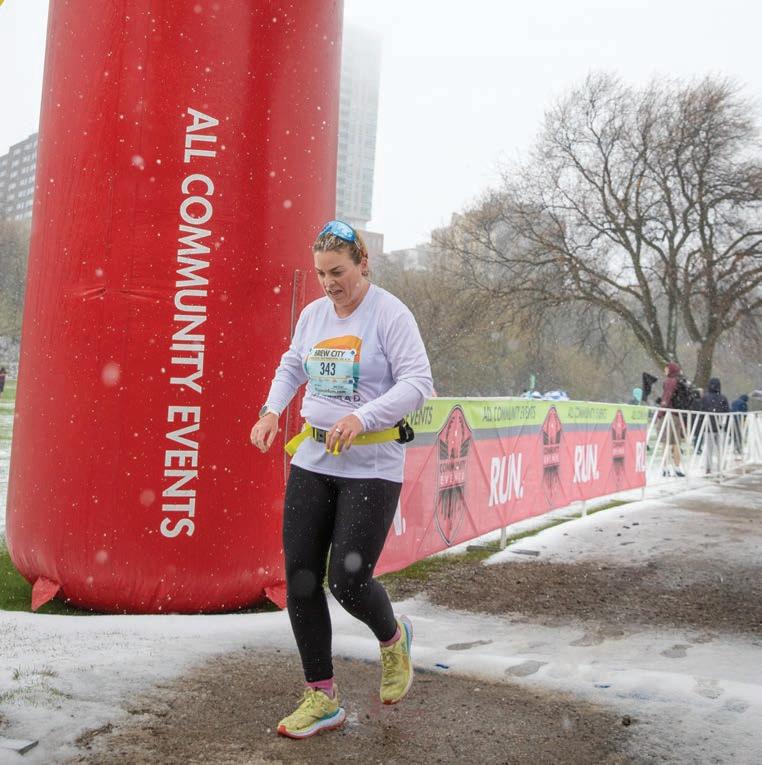
10
Kat at a marathon in Wisconsin, US
Standing Up for Queer Comedy
Mark Bittlestone (2012) on being a comedian

My initial response when asked to contribute to the Martlet was ‘I assume Eric Idle is unavailable’, followed by ‘I assume Joe Thomas is also unavailable’, but it is an unexpected privilege, so thank you! For the record, I have demanded that this piece be sandwiched between one article on stem cell research and another on global conflict, right where my earth-shattering contributions to the world of stand-up comedy belong. On me: I’m a stand-up comedian and I do skits on social media. I gig all over the country – tonight I’m in Southampton, tomorrow Southend, Saturday Greenwich.
I mainly tell jokes about being gay (which I am; it’s not a character piece), not really as a conscious decision but probably because what you’re trying to do in standup comedy is find what is interesting or different about you compared to your audience and then relate it back to their experiences. I got into comedy while at Pembroke, of course! My first steps were on the New Cellars stage in my first year, and they were such ill-prepared steps that I didn’t take any further ones for another two years. I got my History degree (a stonkingly brilliant Double First) and, seeing a bright business career ahead of me, was accepted onto the one-year Business Management course at the Judge Business School, which I devoted entirely to mucking about on the ADC Stage.
I loved every minute of it. I got onto the Footlights Committee and would spend as much time as I could writing sketches for the fortnightly smokers and getting rat-arsed afterwards, and absolutely no time at all learning the fundamentals of Business Management. Deservedly I got a 39 (a fail) in the Economics and Finance module, which the eagle-eyed among you will have observed is sort of the main event. I managed to scrape a 2.1 by inventing a McKinsey-authored report on why FC Barcelona is “Mes Que Un Club” in my Management exam, churning out what I maintain was a genuinely publishable piece of academic writing.
While I feel faintly guilty that I had (presumably?) denied others a place on the course (though to my mind
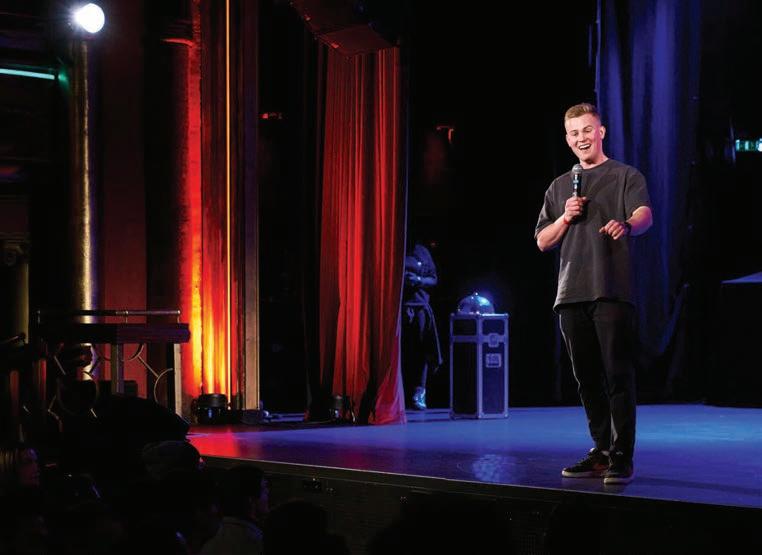
saved them from such lectures as ‘A Brief Introduction to Supply Chain Management’), I gained a huge amount from that year. I had just come out, having spent my first three years at Pembroke cosplaying (not unenjoyably, it must be admitted) as a straight, beer-drinking, football-playing lad. My mum passed away the year before I came up to Cambridge and then my father died a fortnight before my finals. These moments cascaded together to form in me a realisation that I wanted to – and was in a position fortunate enough to be able to – do something a bit different.
I had always enjoyed being an idiot, whether it was pulling a chair from underneath a friend at matriculation dinner, putting fake business cards for a peer in every pigeon hole, or emailing the University Library from a phoney Hermes account imploring that they put their ‘best people’ to the task of locating my lost genital cream. Looking back, if I have any regrets it’s that I didn’t start comedy the moment I set foot in Cambridge, as well as be honest about my sexuality.
But then again, it felt like I straddled quite an interesting time (2012-17) at Pembroke. When I arrived, the rugby team was still absolutely chanting misogynistic songs (and, not to whitewash myself here, I willingly with them). By the time I left, two Presidents of the Pembroke Idlers in a row had been out homosexuals (myself one of them) – they were still bad people, mind, but out homosexuals nonetheless, which did weirdly feel like a sea change from the time of my matriculation.
One of the reasons I think I continue to talk mainly about being queer in my comedy – both onstage and online – is because there is a deep sense still of anger that for about a decade maybe, I had to lie to myself and everyone else about who I was.
I do want to shout out, though - if they’ll permit me - queer trailblazers such as Sarah the Porter, Sally March of the Development Office, and of course Chris Smith, as well as all the wonderful queer students at Pembroke who carried their sexuality much more lightly than I and who meant it was a super easy place to be who I was once I had made that decision. I was delighted to read in Oscar Griffin’s contribution to last year’s Martlet of how welcoming Pembroke is to its LGBT+ students, all the more important at a time when global attitudes are in a speedy reverse.
Back to me though! In the now seven years since leaving Pembroke I have built a career as a stand-up comedian – with a brief stint as a History teacher (they fired me) –and it feels weird to say it, but it’s going alright. Comedy is a pretty tough industry and I’ll almost certainly never make as much money as if I had actually attended a brief introduction to supply chain management (I still work as a private tutor about 3-5 hours a week), but it’s a lot of fun and I get to tell roomfuls of middle-aged Midlanders about gay hookup etiquette.
I really do have everything to thank Pembroke and Cambridge for. A decade on and I can say with full certainty that there is nowhere else on earth that will give you so many packed rooms so regularly in which to horse about and cut your comedic teeth. If you’re a current student reading this, give it a go. But do start with the chair thing – straight after the Master’s speech – a classic never dies!
You can catch Mark at the Edinburgh Fringe this August or on a UK tour next spring, or follow him @markbittlestone.
11
Mark Bittlestone (2012) read History and Management studies. He was shortlisted for the BBC New Comedy Award in 2022.
A Line, the Globe, and a Bird
Prashanti Sen (2021) introduces Pembroke Panels
It was October 2022 and I had the idea to set up a project dedicated to exploring topics of global health.
The aim was to create a talk series where students from different degree disciplines could engage with professionals in the field to see how to use their interests, backgrounds, and expertise to contribute positively to the global health landscape. Given the amount of organisation, dedication, time, and effort required, I had high hopes for the project. These were almost instantly dashed when the first event yielded an audience of … one person! Over the course of all three events held in that academic year, the average attendance was four people… Let’s call this, Phase I.
Skip ahead to the summer of 2023, and I decided to revisit the idea, take what so evidently did not work with the first project, and improve it. Let’s call this Phase II! Several proposal drafts later, Pembroke Panels: Conversations in Global Health & Humanitarianism was submitted for approval to College. There were three main aims: education, empowerment, and effect. These reflected the foundational aims for the project: to encompass opportunities to learn about health and humanitarianism from multidisciplinary perspectives; to inspire confidence; and to foster change. The main principle: no action is too small to make a difference when driven by positive motivation.
We launched Phase II in December 2023, with our first panel discussion: ‘Fighting in the International League Against HIV/AIDS’. The panel was spearheaded by the charity Frontline AIDS, and we were joined by two health professionals focussing on paediatric HIV/AIDS and the underlying mechanics of HIV drug treatments. I am very pleased to say the audience attendance far exceeded four individuals, and, surprisingly, had only one medic! Much of our discussion focussed on how we can drive destigmatisation of HIV/AIDS and what our education systems need to be doing to address topics of sexual health more adequately.
Our next event was also focussed on health but from an eco-perspective. In collaboration with the Cambridge Climate Society, the topic was ‘Wellbeing in a Warming World’. Our innovation was to open this up to local Cambridge Sixth Forms, and we were joined by three keen sixth formers. What was truly brilliant to see was how one of them led part of the panel and audience discussion on the potential impact of human interference with natural ecosystem balance.
celebration of Women’s history month, our panel was led by Women for Women International, a humanitarian charity supporting women survivors of war. We were also joined by researchers in international law and gender studies as well as global maternal health. Our discussion addressed issues of women’s rights, global disparities in obstetric care, and, as raised by one of the mothers in the audience, the importance of interdisciplinary approaches to the school curriculum.

As a lifelong learning project, strengthening community relations between the University of Cambridge and local sixth forms is one of the core goals of Pembroke Panels. I think this properly came to fruition in our third event: ‘Empowering Women Globally: The Journeys to Justice’ where ninety percent of our audience were sixth formers, some of whom also brought along their mothers! In
As I write this, we have our final event for 2023-2024 on the horizon, which is a testament to how time flies! We are hoping to extend the audience invitation beyond Cambridge, as we try and push the limits of what we can do and who we can reach with this project. I say ‘we’ given that Pembroke Panels has been brought to life by so many individuals. I must say thank you to the Pembroke College Catering Department, Development Office, IT Department, and our Sponsoring Fellows. I would also like to thank the alumni and friends of Pembroke College who have supported us both with advice and funding. Last, but not at all least, I wish to extend a huge thank you to the incredible founding Pembroke Panels Committee. The dedication and creativity of all of those who have worked on this project in every capacity has been wonderful. As a final note, I thought I would briefly explain the logo that captures what we are, and hope to be, in three key components: a line, the globe and a bird. The line is actually a textbook graph of the action potential, the currency of our nervous system, underpinning everything that we can and will, think and do. It seemed fitting particularly as this is a lifelong education and action initiative. The globe is representative of the impact that we want to have, and of the wider goal for Pembroke Panels to become an internationally accessible avenue for all to make a difference. The final component, the bird, has a twofold purpose: it is an outline of a martlet (as such I was delighted to be invited to write for this Martlet!), and is also a reflection of how Pembroke Panels started as a fledgling. We could say that Phase I was unsuccessful, or, as I prefer to say, it was an unconventional success. Without it, the thoughts for redirection in Phase II to focus on charity partnerships, community engagement and driving the future through active discussion, would not have occurred. Starting a project is exciting but terrifying in many ways, and when things don’t quite go to plan or seem to fail right off the bat, the motivation to keep going becomes a matter of perspective. You could ask yourself: what if we fall? Or you could ask the much better question: what if next time we fly?

12
Prashanti Sen is reading Psychological and Behavioural Sciences.
Fostering Freedom of Thought
Matthew Mellor, Director of Development
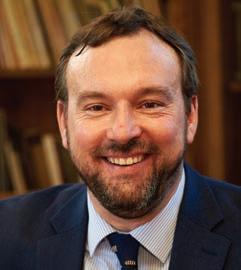
The moral of this tale might have been ‘don’t read emails just before going to bed’, for I was so annoyed by the content of one of them that I struggled to sleep last night. However, having composed and mentally deleted numerous responses to that message, I have felt inspired to respond more obliquely and reprise some of my thoughts, as expressed to the PCCS London Dinner in 2022, and update them accordingly for this 2024 Martlet
In giving that talk, I pondered the question: what kind of college were we celebrating? Reflecting on that led me to one of my favourite Mark Twain witticisms: ‘When I was a boy of 14, my father was so ignorant I could hardly stand to have the old man around. But when I got to be 21, I was astonished at how much the old man had learned in seven years’. I love this quotation. It speaks to my own – probably almost everybody’s – experience of growing up, the self-absorption of those very formative years, my tunnel vision at a young age. And it also speaks to a sense of intergenerational misunderstanding that goes both ways. Neither the son nor the father probably gives the other person credit for having a mind of their own. They can barely be in the same room; yet, through an indelible connection (in this case, family) they are still talking, seven years on. But perhaps the most brilliant thing about it is that it’s beautifully and laconically ambiguous about who has really changed.
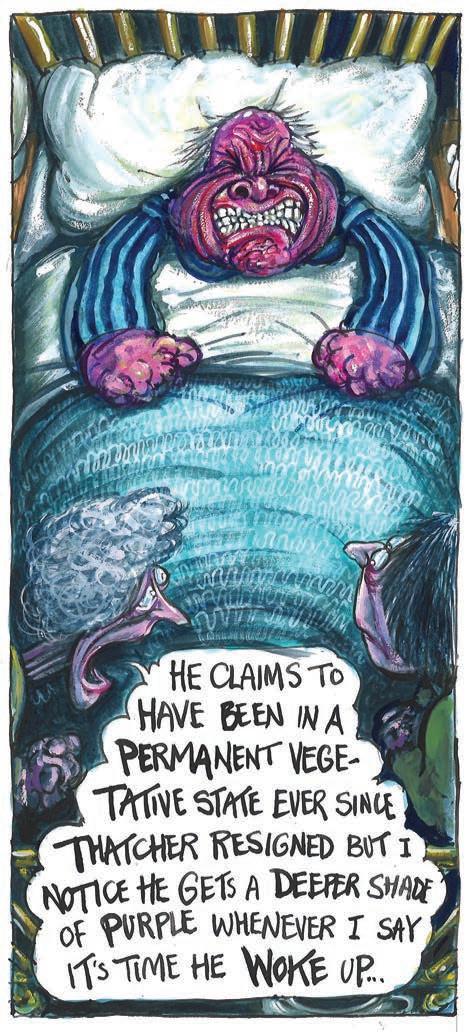
I am privileged to work in a place that witnesses such changes in all who pass through it. There is a marked difference between almost all the 18-year-old freshers I meet as their tutor and the 21-year-olds (or older in the case of the many medics I am privileged to know) who graduate. We like to think, rightly or wrongly, that there is something about Pembroke (in addition to hormones) that makes that difference.
However formative many people find their time here to be, they continue to change with age and with distance. My abject failure to escape this College’s exquisite but vice-like emotional grip affords me the unusual perspective of tracing the evolution in those individuals over many generations now, and it can put me in the position of dealing with intergenerational ignorance on both sides. This is where that email comes in.
What turns out to be the most consistent observation is that, despite the changes on a personal level that thousands of Pembroke people experience, so little changes in the grand scheme of things. Think about your own time at Cambridge – there have been fraught and
contentious matters in every generation in living memory, where those different generations have by and large held often opposing views: religion, gay rights, civil rights, ‘political correctness’, peace, war, Thatcherism, Brexit, long hair, even the admission of women to Pembroke. You name it, the young and the not so young have disagreed about it, often to a near-existential degree.
In all this, Pembroke’s role – Cambridge’s role – any university’s role – in a free society, alongside the commitment to serious research, is to help its students learn how to think, not what to think. If they then gravitate towards a viewpoint that makes others uncomfortable, or we just downright disagree, so be it – let’s argue it out, but in the civil manner that we cherish in a place such as Pembroke. We can even agree to disagree, while not attributing the contested viewpoint to the College itself.
Pembroke should be a non-political place. It has not taken, nor will it take, a political view on matters except perhaps those which affect its very essence, such as Higher Education funding or a commitment to freedom of expression and thought. If it is liberal, it is in the true sense that it is a place where people have the liberty to challenge norms, or defend them, to break new ground, or reinforce established ideas. This is not political in the sense of being partisan or partial.
What made the aforementioned email so vexing, from numerous perspectives, was to read the rather clichéd and boring trope in it that there are fears about Pembroke being ‘too woke’. Nobody at Pembroke thinks it is their job to tell students to be ‘woke’ or not to be so. It is my colleagues’ job to invite them to think about what matters to them, appraise the situation, listen to what others have to say, and apply the lessons they learn in their supervisions, or in their engagement with academics and each other, to the questions at hand.
The current student body can be forgiven for questioning the state of things – just as you doubtless would have wished to be forgiven for questioning the state of the world you were inheriting. And they can be forgiven for sticking metaphorical fingers in metaphorical ears, simply wanting to qualify as doctors, or pass the History Tripos, or broaden their experiences on an internship, or play sport, or act, or sing, or invent, or stay in their room and read. Pembroke is a place where they can and must be allowed to do that, and not have mud slung at them for caring too much or not caring enough.
I spend my professional life helping Pembroke people recognise that the College is both very different from the way it once was (five, ten, 20, 30, 40, 50, 60 years ago) and very much the same as the way it was (five, ten, 20, 30, 40, 50, 60 years ago). I can credibly and honestly manage this paradox only because the College does not weigh into the political debates of the time – often to the frustration of students and alumni alike. Any self-examination, such as whether the College should ‘go mixed’, whether or not it should investigate its past, or question its present, has been based on remaining true to principles of free enquiry, academic curiosity, independence of thought and freedom of expression.
In supporting the College so generously as you do, it feels like you have provided some vindication for the ‘perpetual’ approach to education that Pembroke embodies and which I have tried to describe here. And for that, I heartily thank you.
13
Matthew Mellor
Gossip
From the Gossip Editor
Pembroke College takes its responsibility under the GDPR for processing your personal data safely, appropriately and with transparency. Please be aware that as the Martlet is published online any contribution to the Gossip will be publicly accessible. If you would like to know more about our data protection policy and privacy notices please go to www.pem.cam. ac.uk/dataprotection. If you have any questions or concerns please contact dpo@pem.cam.ac.uk.
We have used the form of names with which letters have been signed, and have throughout omitted titles. The date above each entry is the date of matriculation.
N.B. When sending in a Gossip entry (180 words maximum please!), do please indicate your matriculation date, and, if possible, that of other Old Members you mention. Deadline for contributions to the 2025 Martlet: 18 March 2025.
Gossip should be sent to me, Sally March, by email: Sally.March@pem.cam.ac.uk
Notification about published books should be sent to: Nick McBride
The Editor
Pembroke Annual Gazette
Pembroke College Cambridge, CB2 IRF Or by email to him at: njm33@cam.ac.uk

1961
Colin Richards writes that ‘Over sixty years ago I lost my gown and had to get a replacement. To my delight I got hold of a second-hand one belonging to a ‘Miss Fitton’. I went to dinner in Hall ostentatiously wearing it but later that evening was discomfited to find that one of my friends had defaced it – leaving the label reading ‘Miss Fit’. I still wonder who was the prescient culprit?’ He further recalls: ‘Chris Woon (1961), recently deceased, was an excellent cartoonist. I remember ‘stealing’ two of Chris’s grotesque heads to replace the world maps put up in the geography department before one particular lecture. The lecturer didn’t immediately notice them until he turned to the blackboard to find them staring back at him. To his credit, he continued as if the images were world maps. News of my escapade (and Chris’s cartoons) became common knowledge in the department. Perhaps that accounts in part for my less than distinguished first degree?’
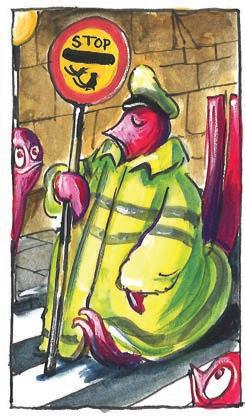
1962
Michael Llewellyn-Smith writes: ‘I have been appointed as the Chair of the Hughes Society of The University of Adelaide which is celebrating its 150th Anniversary in 2024. I have also been invited to join the Cambridge University Alumni Networks and Volunteers Working Group. I am enjoying playing croquet in my retirement’.
1963
Tom Jones writes: ‘A group of us who matriculated in 1963 have held regular reunions over the decades. We’ve seen each other’s children grow up and followed each other’s respective careers, on into retirement. We just had to celebrate the 60th anniversary of our meeting in October 1963. Last September we booked three nights at the Hare and Hounds hotel in Westonbirt, Gloucestershire. We visited Newark Park National Trust property and the National Arboretum at Westonbirt. Present were: Mike and Cath Turpin; Keith McEwen and Minnie Wilson; Tom and Linda Jones; Tony Neal; and Carolyn Snaith (Vic Snaith sadly passed away in 2022). Graham and Joan Gerrard could not attend because of illness.
1965
Paul Bowles writes: ‘The online world has undermined the traditional publishing and bookselling that formed my varied career for over half a century. As a result, uneasily feeling that any high street is the poorer without its bookshop, in 2023 I reemerged from embryonic retirement to rectify that lack in the centre of the small town of Royston. My earlier independent shop in Bedfordshire sold only new books, but my current venture, Bow Books (www.bow-books. co.uk), combines that with second-hand, to the delight of a supportive local adult community, whilst setting a challenging temptation to the younger generation. Would that others might be inspired to replicate its template nationwide!’
1968
Jem Poster had his third novel, Eliza Mace, published by Duckworth in March. Coauthored with Sarah Burton, it is the first in a planned series of detective novels and is set in the Welsh borders in the 1870s.
1973
Jonathan Mallinson writes: ‘I retired from Trinity College, Oxford, in 2017, after nearly
thirty years as Fellow and Tutor in French. Since then, I’ve been pursuing an interest in the decorative arts, and have just published a book on William Moorcroft, one of the most celebrated artist potters of the early twentieth century. The book is freely available to read online or download at: www. openbookpublishers.com/ books/10.11647/obp.0349. Having left Pembroke in 1989, before the arrival of email, I have lost touch with many (though not quite all) of the Modern Linguists I taught from 1979 to 1989. If you are reading this, and remember supervisions on staircase S, B or X, in the (old) Master’s Lodge, or in 54 Trumpington Street for that matter, do please get in touch: jonathan. mallinson@trinity.ox.ac.uk. I’d be delighted to hear from you.’
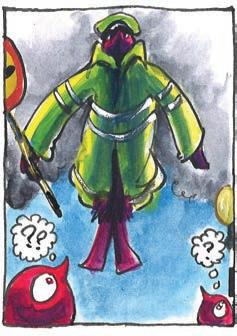
1984
Rory MacLeod writes: ‘In October 2023 I graduated from the University of the Highlands & Islands (UHI) with a BA Hons in Gaelic Language & Culture; then, in November I embarked on a new vocation as clerk of Clèir Eilean Ì: The Church of Scotland in the Highlands & Hebrides.’
1988
Justin Davies writes: ‘I was elected a Fellow-Commoner (History of Art) of Trinity Hall on 1 December 2023.’
1991
Matthew Murray writes: ‘Following successful trials, I represented the Great Britain Medical Football team (GBMT) at the World Medical Football Championship in Vienna,
Austria in July 2023. After winning the Group Stage against Catalonia, Mexico, and Canada, the GBMT beat Czech Republic 2-0 in the Quarter Finals, beat Poland on penalties after a 1-1 draw in the Semi Finals, before a narrow 1-0 defeat to Ireland in the final.’
1997
Chris Hutchings writes: ‘After spending rather too much time writing music and not really as much time on my maths degree as I should have done while an undergrad, I went on to do a Master’s in composition and now compose music for a wide variety of choirs around the world (though my day job is in website management). A particularly exciting upcoming performance is as part of a multi-composer project called Choirs for Ecocide Law, campaigning for an international law to prevent the destruction of nature – this will include a performance by a 1,000-person choir in Finland in April 2024! For more about the project, see www.stopecocide.earth/ choirs. I’ve written a lot of other climate-focused choral music, which you can find at choirsforclimate.com, and works from there have been performed by several major groups in the US and UK, including a Creative Scotland funded concert in Edinburgh in March 2023. I’d be happy to hear from any ex-Pembroke choir directors or singers who are looking for new choral repertoire. More about my music and work can be found at www.hutchingsmusic.co.uk.

14
Poet’s Corner
All winter long
the wood frogs lie in wait, frozen so hard if dropped, they’d clink. Inside their cells something is waiting, waiting for spring –a change of key before they wake and sing in high-pitched chirps and peeps and trills that settle, for a moment, into something like a pattern.
Becoming Mineral
those are pearls
All things must cool, all points of light –the sun, the heart, the bird that nests on the volcano’s edge, lava creeping steadily –will crystallise –obsidian, garnet, green Vesuvian –cold to the touch, and still, and bright.

Mina Gorji is Associate Professor in English and fellow of Pembroke College, Cambridge. She has two collections of poetry published by Carcanet: Art of Escape (2020) was a Telegraph Book of the Month; Scale (2022) was a White Review Book of the Year and was described in Poetry Review as ‘a gorgeous book of miniatures’ and in the Irish Times as ‘a book of deep sonic attention’. She has published widely on lyric poetry, and is co-director of the Centre for John Clare Studies.
15





























